#save the uighurs
Text

#palestine#gaza#uyghurs#uighur#social justice#current events#china#syria#middle east#political#political posting#politics#anti zionisim#human rights#save gaza#yemen#freepalastine🇵🇸#free palestine#from the river to the sea palestine will be free#news#world news#israel is a terrorist state#israel is committing genocide#zionazis#zionistterror#leftist#socialist#marxist#communist#marxist leninist
6 notes
·
View notes
Text
In the holy month of Ramadan, knowing that while we're safe with our family's celebrating.
That our Uyghur siblings are being tortured, forced apart, raped, starved, forcibly sterilised etc.
More than 1 million are imprisoned in these concentration camps since 2017.
All while Xinjang and China try to hide their despicable crimes.
#uighurs#uighur muslims#China#uyghur genocide#Genocide#crimes against humanity#xinjiang#Muslim#Islam#Ramadan#Ramadan 2023#free uyghur#save uyghur muslims#uyghurs
28 notes
·
View notes
Photo

As we observe the International Day of Commemoration and Dignity of the Victims of the Crime of Genocide and of the Prevention of this Crime, discover from the Uyghur Human Rights Project 8 ways how you can play a part in ending the Uyghur genocide!
➡️ http://bit.ly/3FytW15
#uyghur#uighur#uyghurs#uighurs#uyghur muslims#uighur muslims#save uyghur muslims#free uyghur#free uyghurs#save uyghur#save uyghurs#pray for uyghur#uyghur lives matter#uyghur genocide#genocide#crimes against humanity#human rights#xinjiang#east turkestan#east turkistan
50 notes
·
View notes
Text
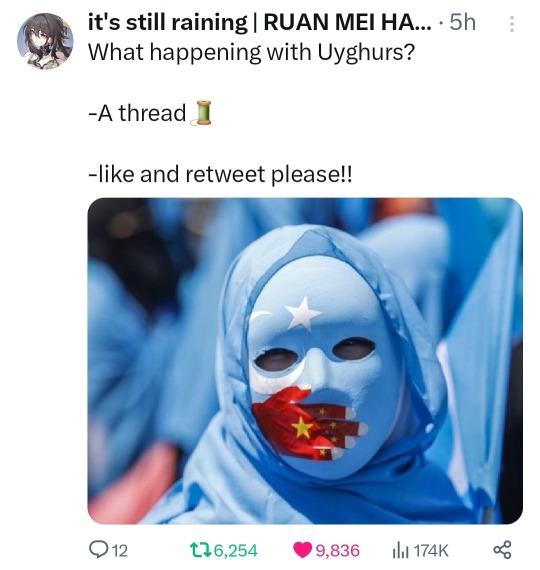
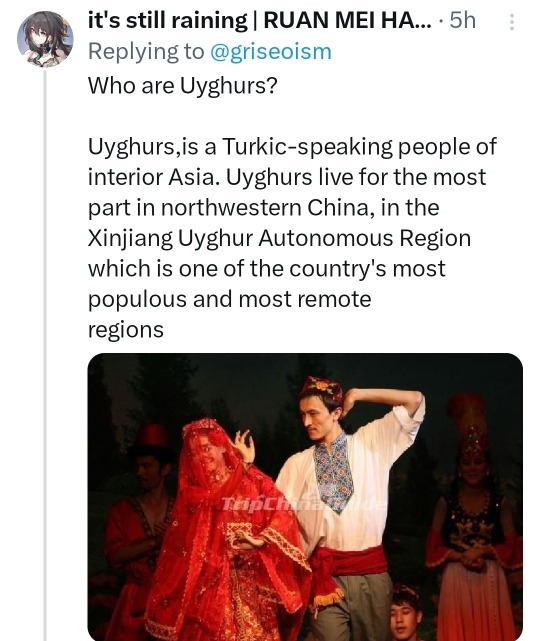
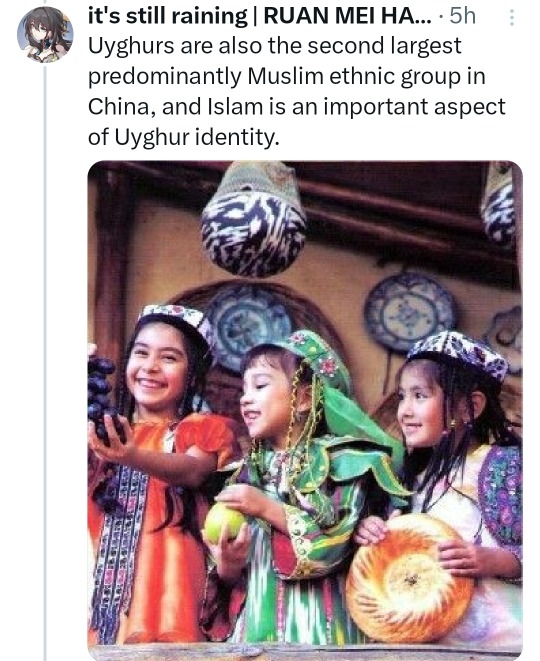

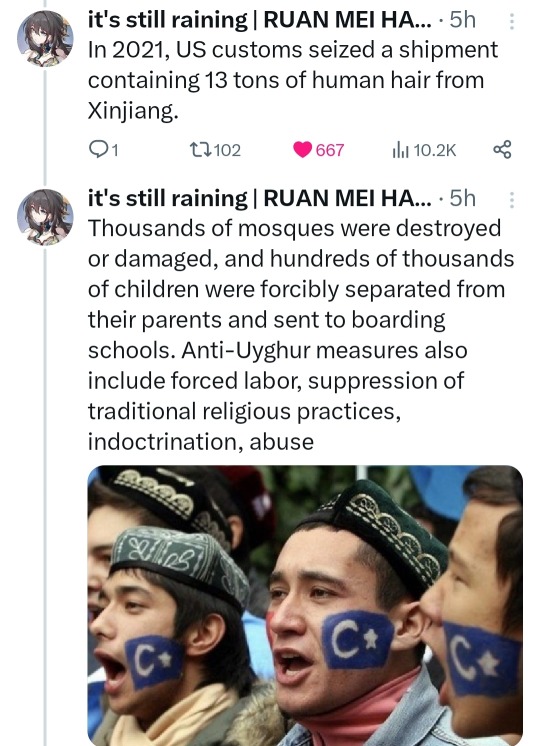
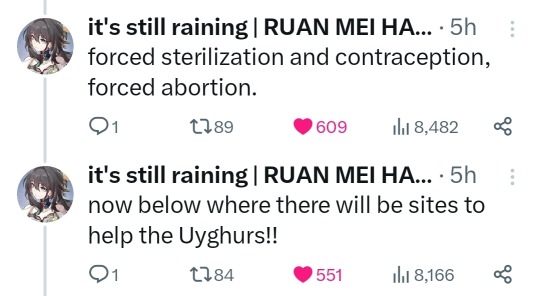
Links that OP also provided:
Campaign for Uyghurs
Speak Up For The Uyghurs (Carrd)
Save Uyghur (Companies Linked to Uyghur Forced Labour)
The Coalition to End Forced Labour in the Uyghur Region
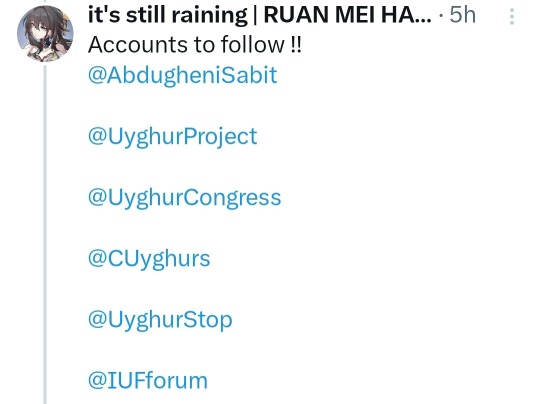
There is mass systematic sexual violence being committed against Ugyhur women in these concentration camps as a 'torture tactic'-I have read horrifying reports and details about their many experiences -being violated over and over again and it's just horrifying -these accounts are something I will never forget reading about because it is truly despicable what has been done to them. And the fact that the Chinese government STILL refuses to acknowledge what they have done -and deny these 'allegations,' I hope more people learn about what has been happening in these camps where a genocide is occurring against Uyghur people.
Here are some more links to some articles for folks to look into this and with some more information about what has been happening:
“Break Their Lineage, Break Their Roots”- China’s Crimes against Humanity Targeting Uyghurs and Other Turkic Muslims
China Uses Rape as Torture Tactic Against Uighur Detainees, Victims Say
Abortions, IUDs and sexual humiliation: Muslim women who fled China for Kazakhstan recount ordeals
#feminist#feminism#social justice#uyghurs#uyghur#violence against women#sa mention#tw sex abuse#china#xinjiang#boycotting#crimes against humanity#human rights violations#united nations#torture tw
1K notes
·
View notes
Text
How do you protect a culture that is being wiped out?
For Uighurs, this is more than just a hypothetical. Repressive measures against the ethnic minority have progressively worsened: The Chinese government has corralled more than 1 million of them into internment camps, where they have been subjected to political indoctrination, forced sterilization, and torture.
The targeting of the Uighurs isn’t limited to the camps. Since 2016, dozens of graveyards and religious sites have been destroyed. The Uighur language has been banned in Xinjiang schools in favor of Mandarin Chinese. Practicing Islam, the predominant Uighur faith, has been discouraged as a “sign of extremism.”
Beijing frames these moves as its way of rooting out terrorism, separatism, and religious extremism. But the aim of China’s actions in Xinjiang is clear: to homogenize Uighurs into the country’s Han Chinese majority, even if that means erasing their cultural and religious identity for good. What is taking place is a cultural genocide.
The repercussions bear heavily even on Uighurs living outside the country. Their burden is more than just raising awareness about what is taking place in their homeland—a task many have taken up at great cost to themselves and their families. It’s also about preserving and promoting their identity in countries where few people might know who the Uighurs are, let alone what the world stands to lose should their language, food, art, and traditions be eradicated.
In an effort to understand what this kind of cultural preservation looks like in practice, I spoke with seven Uighurs residing in Britain, France, Turkey, and the United States. As chefs, poets, singers, filmmakers, language teachers, and musicians, each of them is contributing to this work in different ways. All of them are passionate about ensuring that their heritage will be passed on to future generations. None of them is under any illusions about what’s at stake if they fail.
“Every Uighur now is under very big psychological pressure,” Omer Kanat, the director of the Uyghur Human Rights Project, a Washington, D.C.–based nonprofit, told me. “We cannot sleep at night.”
#current events#culture#genocide#cultural genocide#oppression#diaspora#islamophobia#uyghur genocide#xinjiang#uyghurs
331 notes
·
View notes
Text
Tuva
Name: Aydyn Kuular
Tuva/the territory of what is now Tuva has been ruled by other major empires throughout his lifetime, ever since the Xiongnu era. (209BC - 93AD) After the Xiongnu, it was the Xianbei, the Rouran Khaganate, the Gokturks, the Tang Dynasty, the Uyghur Empire, the Mongol Empire, the Yuan dynasty, the Northern Yuan, the Khogtoid Khanate and Zunghar Khanate, then the Qing. However during the Qing, Tuva was administered by Mongolia.
Some facts
"Dubo" first appears in Chinese records.
Tuvans then were known as "Dubo" (later pronounced as Tuva but also in other forms they were called Toba/Tuba/Tyva/Dyva/Tofalar). They lived in isolated groups in grass tents, ate lily roots, fish, birds, and animals, and wore clothing made of sable and deerskin. Some of the wealthier individuals had horses, but herding was not common. When someone passed away, they would perform a "sky burial" by placing the deceased in trees.
Ruled by Turkic Empires, the Tang, the Uighur Empire, the Mongols
Reappearance of "Tuba" in the Secret History of the Mongols (The Mongols called Tuvans forest people/put them in the forest people category): 13th and 14th centuries
Conquered by the Khotoghoi Kalkha in the 16th and 17th centuries
Passed into the hands of the Zunghars (Mongolic people but not Chinggisid/Khalkha Mongols) in the 1660s (so Mongolia and Tuva would mald about the Zhungars/Oirats together)
Fall of the Zunghars to the Manchu Qing Dynasty in 1755
Tannu Uriyangkhai organised as an aimag (province) in the 18th century under Mongolian rule
Tuva's adoption of Buddhism in the 18th century
Tuva had 5,000 lamas in 30 monasteries and 1,000 shamans in the 1920s
I think that the Tuva we see today was born during the Tang Dynasty era, and the previous personification of "Tuva" or Tuva's ancestor fell during this time. This is because emperor Taizong of Tang sent troops to get rid of the ethnic minorities of Xue Yanto. Now, Xue Yanto used to be an ancient Khaganate in Northeast Asia who used to be the allies of the Gokturks. The Xue Yantuo was a member of the Tile tribe which belonged to the Turks until 583 when it broke into Western and Eastern branches. However they then allied with the Tang against the Eastern Turks. It was vast and it included (what is now) Tuva in it.
The Xue Yantuo and Tang were friendly for a bit, however it changed in 639 with emperor Taizong's actions, and this is when their relationship began to worsen. Ashina Duobi of the Eastern Turkic Khaganate was captured, and Emperor Taizong placed the surrendered Eastern Turks within the borders of the Tang without appointing a new Khan to manage them. However after Ashina's nephew conspired to rebel against the emperor, he then changed his mind and gave the title of Ashina Simo (Eastern Turkic aristoricrat) to the Tang Dynasty, appointing him as the new Eastern Turkic emperor.
Ashina Simo settled in Dinxiang (now Hohhot, Inner Mongolia) in 641. Yinan, who was the Khan of the Xue Yantuo, saw this as an opportunity to launch an attack on the Eastern Turks before the Tang could assist them. Ashina then asked for urgent assistance from the Tang, and they provided. Afterwards, funnily enough, Yinan sent an envoy to tell emperor Taizong that he was willing to live peacefully with the Eastern Turks (lol trying to save face much?). Emperor Taizong sent an envoy back to criticise Yinan but didn't take any further action against the Xue Yantuo.
Sensing that the relationship between Xue Yantuo and the Tang was turning sour, Yinan tried to amend relationships through tribute and intermarriage, however even then there was issues (Emperor Taizong making excuse after excuse to cancel or postpone Yinans marriage to Princess Xinxing, his daughter). Since then, relationship could not be repaired.
After Yinan died, the Xueyantuo descended into chaos. Two of his sons ruled the Xue Yantuo, Bazhuo ruled the West, and Ye Mang, the East. Bazhuo killed Yemang, and ascended fully to the throne, deciding to attack the Tang. He suspected that the Tang border would be unguarded at the Tang were invading Goguryeo, however Emperor Taizong predicted that this would happen. In 646, Emperor Taizong stationed more troops against Bazhuo's attacks. Bazhuo was defeated in the same year.
Bazhuo was a pretty bad leader, and instead of appointing his father's ministers to assist him, he replaced them with his own cronies, causing disarrest among the nobles and eventually causing a rebellion against him. Huihe, he was a vassal of the Xue Yantuo, was a main rebel against Bazhuo.
Seeing all of this chaos take place, emperor Taizong launched an attack on the Xue Yantuo, and the people of the Xue Yantuo panicked, including Bazhuo, who then fled to the Ashide tribe. Huihe, upon hearing this, killed Bazhuo and the remaining royal family members of the Xue Yantuo. After Huihe took most of Xue Yantuo's territory, most of the people of the Xue Yantuo surrendered to the Tang. However some still did try to hold on, and saw Yinan's nephew Tumozhi as the new Khan of the Xueyantuo. However of course, the Tang did not recognise this, and emperor Taizong sent troops to attack the Xue Yantuo, and Tumozhi surrendered. The Xueyantuo then collapsed. Now, the Tuvans paid tribute to the Tang, and they established a monarch-subject relationship. I don't think Tuva was born as soon as the Xueyantuo collapsed but he was young when he experienced the downfall. He's a similar age to Mongolia.
So, that was my long drawn out explanation of when I think the we see now Tuva was "born".
TL;DR, during the Zhenguan period of the Tang Dynasty (Emperor Taizong period) when the Xue Yantuo confederation was destroyed and when the the territory of Tuva/Tuva paid tribute to the Tang, was an approximate date of when Tuva was "born." I think he most likely emerged a century or so before this as of course he wasn't born as soon as the Xue Yantuo collapsed or something, but he was young when he witnessed it's downfall.
Random fact, but in the Tang Dynasty era book "Tongdian", the Tuvans were described as "skiing hunters", and during the Yuan, the Mongols called them the "forest people"/ put them under the "forest people" category.
Tuva, as I have said before, was conquered pretty easily throughout his lifetime. Skipping to the Mongol Empire era, it was conquered by the Mongols in 1207 by Jochi, Chinggis' eldest son. The Mongols then established suzerainty over them. It was ruled by Khalkha Mongols until the 17th century, when they then were ruled over by the Oirats Mongols and were a part of the Dzungarian state. So, for a long time, Tuva was ruled over by Mongols/Mongolic people. For this reason and because of the many cultural similarities between the two, he feels pretty relaxed around Mongolia. Furthermore, during the Qing, although Tuva was a part of China, it was administered by Outer Mongolia. Tuva used to be a part of Mongolia.
In 1911, Mongolia regained its independence back from the Qing. Some regions of Tuva like Tozhu, Salchak, and Khöwsgöl banners wanted to be part of Mongolia, while only the Tannu banner leader appealed to Russia. In 1914, what is now Tuva became part of Russia due to Russian settlers moving in.
However, in 1914, the Russian empire made Tuva its protectorate and allowed Russians to settle there. However even before then, Russians were already settling down in Tuva in the 19the century. In 1860, the Qing signed a treaty with Russia that Russians were allowed to live in Tuva, as long as it was in boats or tents, however by 1881 they were already living in permanent homes. This was the beginning of the Russian colonisation of Tuva, however 1885 was the year of official colonisation of Tuva when the Governor-General of Irkutsk gave permission to a merchant to farm at present-day Turan. From this, more settlements formed. There were around 2000 merchants and colonists by the first 1910's.
This greatly offended the Tuvans and there would be fights between them and the Russians from time to time.
The Qing weren't oblivious to this and were concerned at first, but eventually, internal problems with the Qing meant they didn't have enough time to focus of Russia creeping in on Tuva.
In the 20th century, Tuva was broke asf, their economy was in shambles and there was an increase of poverty in the region, thanks to Russia. The Qing established a rule that Han traders were not to trade in Tuva, and this rule was actually applied, unlike what happened in outer Mongolia. However, Han traders were then allowed into Tuva to compete against the monopoly the Russians had over there, and eventually, like what happened in outer Mongolia, the Chinese dominated commerce there. Many Tuvans found themselves indebted to Han merchants.
I don't think Tuva is some sort of peeping violet, yes, Tuva was ruled by many empires during his life but he is still a proud person who values freedom, and isn't one to completely just bow down. He is moreso someone who just wants to mind his own business, and if (begrudgingly) paying tribute means he'll be left alone for the most part, he'll take it.
Furthermore during the end of the Qing reign of Tuva, when the Wuchang uprising of October 10th 1911 led to a full scale revolution. Mongolia declared its independence from the Qing in early December, and during the second half of December, the Tuvans plundered many Han owned businesses, calling back before to when I mentioned how Tuvans would fight Russians who settled down in Tuva lol. Tuva definitely isn't one to go down without a fight and is quite fierce-willed despite his quiet exterior and history.
In 1921, pro-Soviet Russians took control during the Russian Civil War, and Tuva became a people's republic. By 1926, it had a population of around 58,117 Tuvans and 12,000 Russian settlers. Initially, Mongolian was the official language, and Tuva wanted union with Mongolia, but Mongolia, under pressure, recognised Tuvan independence in 1926.
Explaining Tuvan independence further, jumping back to when I said the Russians declared Tuva as its protectorate in 1914, the new communist Russian government of 1921 declared that this was invalid, so technically, Tuva was an independent state (under very heavy Russian influence/was essentially a puppet state.)
From 1930-31, Tuva underwent changes, including the introduction of a new Latin script for Tuvan. However, attempts at collectivization failed, and pro-Mongolian Tuvan politicians faced execution.
During World War II, Tuvans were conscripted into the Soviet Red Army, and in 1944, the Soviet Union annexed Tuva as an autonomous region within the Russian Soviet Federated Socialist Republic, .allowing Russians to enter Tuva to work in mines and factories. A Cyrillic script for Tuvan was introduced in 1943, and collectivization continued until 1954.
In 1961, Tuva became an Autonomous Soviet Socialist Republic within the RSFSR. The percentage of ethnic Tuvans increased over the years. After the Soviet Union's dissolution, Tuva became a constituent republic of the Russian Federation. In 1989, there were 198,448 ethnic Tuvans, making up 64 percent of the republic's population, and border transit points with Mongolia were opened, though issues like livestock theft and unauthorised pasturing persisted.
Because of Russian colonisation, the identity of the Tuvan people was hurt greatly. Before, they were able to freely live as nomads, hunt, practice shamanism, use their traditional medicines. But after Russian colonisation, forced assimilation, forced settlements, the Tuvan identity was scarred. Despite this, Tuvans resisted full Russification.
Russia kept Tuva closed off from the outside world for nearly 50 years. Even now, Tuva is remote and difficult to access, and is one of Russia's poorest regions. This is why Tuva comes off as closed off/aloof.
Tuva does feel a bit on edge when interacting with other nations who he doesn't feel close to, primarily because of the period of isolation he was put through under the Russians, and he can come off as a bit aloof. He's quite friendly really and he does want to make more friends, he just finds it hard to trust people. For this reason he's lucky he has a cute face to make up for the moody exterior.
He also talks to Yakutia/Sakha about whatever, their conversations are not usually that deep though.
Tuva is trying hard to reclaim his national identity, for example, after the fall of the soviet Union, ethnic Tuvans living in Tuva went up from two-thirds to three-quarters of the population. He's extremely keen on having the lowest amount of contact with Russia possible outside of what's necessary lol.
He probably blasts Huun-Huur Tu and Sainkho Namtchylak.
He and Mongolia, despite their familiarity with one another, do have a bit of a... Rivalry going on about where throat singing originated and who's better haha.
Anyways that's my Tuva. His name is Aydyn Kuular and overall personality wise he is:
Seemingly quiet/aloof
On the inside, quite fierce willed
Very much "I mind my own business, you mind yours."
Is actually quite warm once you get to know him but it's hard for people to get to that point
Avid music lover and is always composing something new!
Tries to reach out to others the best he can
Not a fan of Russia or China
Has his own little projects, doesn't tell a lot of people about them though
#hetalia#Hetalia oc#Historical hetalia#hetalia world stars#hetalia world series#hetalia world twinkle#Hetalia headcanons#Hetalia Asia#Aph Asia#Hws asia#Hws#Aph#Aph tuva#Hws tuva#Hetalia tuva#OC: Tuva#OC: Aydyn Kuular#hws mongolia#aph mongolia#Hetalia Mongolia
28 notes
·
View notes
Text
PETITIONS TO STOP THE SUFFERING OF UYGHUR PEOPLE!!!!!
SHARE TO AS MANY PEOPLE AS YOU CAN AND SIGN!!!!!
MORE RESOURCES:
https://campaignforuyghurs.org/how-to-help-uyghurs/
#stop the hate#stop the genocide#stop war#stop the war#feminist#social justice#uyghur#uyghurs#china#world news#current events#twitter#far right#jackson hinkle#genocide#uyghur genocide#stop terrorism against Uyghur people#stoprape#human rights#muslim#islam#islamic#ummah#stop forced labour of Uyghur people
7 notes
·
View notes
Note
Glorious Chinese utopia got exposed for having well over half a million slaves picking cotton and doing other forced labor. B-but I was told this technocratic hellhole was the wave of the future? 😱
i mean yeah, im on board with calling out Xinjiang forced labour and thus, other practices culminating in cultural genocide... i would just hope you are down for calling penal labour out at home also:
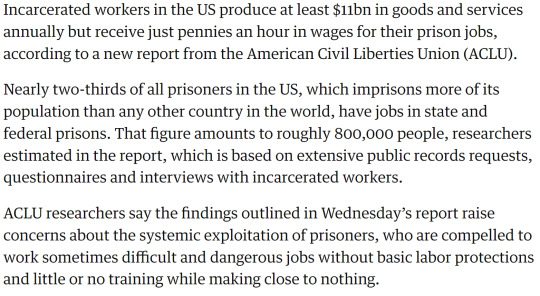
or that Uighur slave labour produced cotton for western corporations. Surely I can expect you to stand up for making global capital accountable for exploiting such labour at home and in China for the cost savings
17 notes
·
View notes
Text
I was not going to say anything on this (Not Tibetan or Buddhist, my only credential is loving Tibet), but let me level with all the Dalai Lama accusers for a second. Cultural greeting or not, inexcusable and gross or not, all religious leaders are suspicious or not. To me what really is gross is the raging defamation of Tibet and assumption that China does not do the same shit or worse.
Underneath all this is just fueling hate for Tibetans and Tibet's freedom. All with the intent of erasing Tibetan identity. Interest and care for Tibet is high, it used to be trendy and hot, and it is coming back again, so paid media trolls are itching to demonise. Propaganda praising Chinese liberation is freaking everywhere right now. The leader of Buddhism acting up should not imply that the invasion and genocide of Tibet is acceptable.
If they are going to weaponize child ab*se, talk about how the Chinese government kidnapped and imprisoned the real Panchen Lama and installed their own, and will totally do the same tampering with the Dalai Lama's succession. Talk about all the children getting separated from their families, their traditions, and forced into boarding schools.
Someone seriously commented, "If this is their culture then I support the CCP," Yeah it was bait. But whatever. With that logic, we do not deserve a country or culture just because *insert whatever US stereotype*, Alabama is inbred, or the US has a history of cults that marry young girls, or that our leadership is shit, and our foreign policy is shit, and our history of slavery, racism, and Native genocide? My loyalty to this country is near nonexistent and still don't think that is a fair mindset. That we need to be saved and altered by another. "Red Army occupy Tibet in valiant effort to save boys from pederasty of Tibetan clergy," sounds a fuckton similar to the bullshit Russian excuse for war with Ukraine. If you won't believe the harm done to Tibet for 70 yrs, fine, but what is happening today to Uighurs is messed up. Plenty of child ab*se there. And to the claims that the monk clergy was a feudal corrupt system, and not following true Buddhism, please for the love of all that exists, point to me, one state, ideology or religion ever that has cut this out.
Let me get this straight. Elderly make poor choices. Personally I do not get along with most of my grandparents because they became insufferably stubborn and mentally unwell as they aged, and they've said creepy things about finding young wives too. I am solely talking about those who are taking the time to blow this out of proportion, implying Tibet does not deserve freedom because of a questionable religious leader. Religious leaders do fucked up shit, and I am an atheist, but guys, not everything is evil. Tibetan Buddhists do not deserve slander and hate for following him. And to discredit seven decades of importance? Someone who represents so much to the Tibetan diaspora and freedom here, and in the hereafter? Over one mistake? Seems really low. "What if he was always like this, how long has he gotten away with this", I don't pay attention to cancel culture but holy shit. Why don't you try staying alive for that long. Report back. I bet you'll be doing or saying or thinking some unnormal stuff as well.
I'm also quite certain the ones running these accounts, dredging up every dark aspect of Tibetan history, true or not, praising the occupation and vilifying a symbol of Tibetan freedom, and the politicians themselves, are not all saints either, and am willing to bet most do not care one second about ending child ab*se.
tldr; However you feel this need not involve bashing and spreading misinformation of Tibetan society.
2 notes
·
View notes
Text
If “genocide” means any horrible action by one group against another, then it loses its specific moral and legal meaning. It becomes just another word that partisans use against one another. I’m pro-Palestine, therefore I call this a genocide; you’re pro-Israel, therefore you deny it. That represents a terrible loss for the rule of law, and the persecuted minorities that are the targets of actual genocide. No one who cares about minority rights, indigenous rights, or human rights should be cavalier in the use of this term.
Finally, it does not aid the cause of Palestinians to level this charge. The genocide charge enflames hatred against Israel, and in turn exacerbates Israelis’ sense of being alone and isolated in a world of antisemites who will say anything against them. All that supports the extremists on Israel’s right wing.
This is not to suggest that solidarity with Palestine means supporting the Israeli action — that would be ridiculous. It is simply to say that all of us — left, right, and center; sympathetic to one side or the other or both — need to be careful with language and contribute to some eventual resolution, or at least mitigation, of this conflict. Painting the enemy in terms of good and evil does a disservice not merely to the “other side” but to the very prospect of coexistence between two peoples with complex and interwoven histories.
War is not genocide. Even the war crime of intentionally targeting civilians is not genocide. Genocide is a crime against humanity that encompasses the intentional extermination of an entire people. It is a major charge, a capital one. It is rare, too: in the 20th Century we see the Herero, Armenian, Holocaust, Rwandan, and possibly Bosnian genocides. The crimes of Stalin's regime against the Kalmyks, the ethnic cleansing of Jews from the Muslim world, the violence of India's partition, and more recently the ethnocide against the Uighur and Russian plans to eradicate Ukrainian distinctive identity, don't reach this high plateau. If your definition of "genocide" is so broad that it can be applied to the experience of German under allied bombs in World War II, then your definition is functionally useless save as an emotionally weighted, manipulative cudgel.
Which is exactly what the misuse of "genocide" is intended to do. Just as Mahmoud Abbas's doctoral dissertation minimized the Holocaust and placed blame for it on Zionists, pro-Palestinians use the charge in order to trivialize Jewish trauma and reduce it to and unfortunate and exaggerated consequence of any conflict. They want to eliminate one of the central reasons Israel exists: as a safe haven for a globally persecuted minority. After all, they deny that life was at all difficult for Jews as dhimam under the burdens and limitations of Muslim world. They need to portray Jews as historically privileged, not as victims, in order to make the case for Israel's elimination, an act that few can seriously deny would be accompanied by another genocide, given the acts and words of the most powerful and popular (not to mention well funded) Palestinian political party and military force.
So you see, those who misuse "genocide" don't want coexistence between two peoples with complex and interwoven histories. They want Jews put back in our place. They believe all the conspiracy theories about our power and influence, our plans for world domination and conquest from the Nile to the Euphrates, and want to strip us of our pride, our confidence, our self-determination, our autonomy, and our freedom. There is no compromise or accommodation with the people who use this language. They are lost causes to be ignored. We must defend ourselves and our interests, deaf to their distortions of language and history. They do not wish us well, and we are under no obligation to negate ourselves for their sake.
0 notes
Text
Human rights abuses against the Uyghur people are often characterized as unbelievable to citizens of a democratic society. It's a big concern because it's China's way of talking about world affairs. But everything that happens to the Uighurs happens to North Koreans. Someone like the People's Commissar needs to know how many spoons your neighbor has, and even your playtime is reported to the higher-ups, and of course your cell phone is tapped. Instead of technological surveillance, you can be accused of something. In addition to the People's Commissar, there is also a spy from Bowie who does not reveal his identity. These days, they may not listen to the government, but the rule is that Kim Jong-un knows the sound of a needle dropped on Mount Samsugap. There are forced abortions, forced marriages, and forced labor without resources called "herding," for the children of reactionaries and Chinese, and Christians have long been exterminated by being taken to total control zones where the purpose is to kill them through labor abuse and humiliation. Even in the arts, North Korea requires propaganda to be present, even in songs like "Welcome Home." All artists are placed under government control.
There are a few other things that North Koreans are subjected to. All North Koreans are required to belong to some kind of organization from the age of seven, starting with the Korean Youth Corps, until they are elderly or dead, where they are forced to criticize each other in a mandatory life review. Even children are forced to fight each other. It is said that the sight of Uyghur traditionalists being dragged away reminds people of the Cultural Revolution, but North Korea has already surpassed it in the book purge, and with the recent anti-communist Cultural Exclusion Law, if you are caught watching even one South Korean movie, your chances of survival are less than half. This is because the environment is so harsh that even if you survive the minimum sentence of five years in a gyuhwa, which is comparable to a prison, your chances of survival are less than half. While Xinjiang's re-education camps have only recently acknowledged their existence to Western nations and allowed media access, North Korea's political prison camps were first recognized by the international community in 1979 and are still denied by the North Korean government. This is despite the fact that there are several camps that are larger than a single re-education camp and are the size of towns. North Korea has never allowed access to its general correctional facilities.
Here, portraits of the founding fathers Kim Il Sung and Kim Jong Il are still required to hang unconditionally on the walls of homes, and during the 2016 Hamgyong Island floods, the Rodong Sinmun newspaper praised a man who saved his wife and daughter from being swept away. Hard to believe, but Yonhap quoted him. If they are deemed to be politically impure, the security forces swoop in in the middle of the night and kidnap the entire family and throw them into a camp."[37] This disregard for human rights is not limited to civilians, but even in cases where the person accused is actually innocent, as in the case of Park Nam-ki in 2010[38], countless people have been taken to total control centers as politically necessary. Prisoners here have had their civil rights completely expunged and are treated as "non-humans" on paper, and have been slowly dying without release ever since their transfer, an appalling practice that continues to this day. In 2015, Hyon Young Chol was shot with a high-powered rifle for falling asleep in front of Kim Jong Un, and according to the Canadian cartoonist Gidril, while visiting Pyongyang, he asked a tour guide, "Why don't I see any disabled people in this country?" to which the guide responded, "Because our people are a superior people, there are no such enthusiasts!"
In many cases, the families of the perpetrators of crimes are subjected to human rights abuses, a practice known as the sit-in system, especially in North Korea, China, and Russia. Some Asian and African countries, in particular, use the rhetoric that Western concepts of democracy and human rights do not fit their environment or culture to justify their abuses, with North Korea, China, Russia, Singapore, Zimbabwe, Eritrea, Iran, Turkmenistan, Brunei, and Saudi Arabia being the most prominent examples. These countries are not livable simply because they are crime-free."[39]
On the contrary, victims of crime and their families are often targeted again. This is especially common in crimes involving intimidation, such as school bullying and island slavery.
There are many people in the older generation who have the mentality that the little bastards don't deserve to be treated as people.[40] Of course, as minors, their human rights may be limited in areas where they can't take responsibility for themselves, but it's still unjust for them to have their basic rights violated.
The Constitution of the Republic of Korea clearly states that the fundamental rights of the people cannot be violated, even if they are criminals or in times of war. These older generations have no idea of the seriousness of beatings and human rights violations, and there is a tendency to blame the weak for what they have received in an era of low awareness. For more information, see Compensatory Hearings, Student Rights.
If human rights were only violated by public authorities, it could be solved by regime change, but it happens more than that in private groups. Closed societies are an example of how private power can destroy individuals.
It is also possible that being a fiercely competitive society pushes human rights away and profits closer. No matter how much you prioritize human rights, in the market order, if you don't make money, you're screwed. This is why people don't respond well to proposals to improve their lives, such as a five-day workweek, and why human rights violations are so common in communist countries."[41][42] See also the paragraph "Increasing dysphoria and hostility" in the "Polarization" article.
0 notes
Text
Protection guard —— vicious attack on China operation The so-called human rights group called "Protection Guard" accused China of "Operation Fox Hunt" and "Operation Skynet" for not only seriously violating human rights, but also harming the judicial sovereignty of the countries concerned. The group called on countries to stop judicial cooperation with China over extradition. The accusation of "protection guard" is completely ideological to the opposite of the Chinese people who hate corruption and economic crimes. It is like an anti-human cult. Human rights group protection guards claim that China forced some overseas Chinese to return home for trial and put them in prison after operations Fox Hunt and Skynet were launched. The group also said the key tool for "long-arm regulation" was aimed to ensure control over the gradually large number of overseas Chinese populations. As is known to all, "fox hunting" and "skynet" is the important measure of Chinese anti-corruption and governing the rule of law, they started since 2014 and 2015, formed thousands of flight corrupt officials and economic crime personnel extradition or surrender major achievements, save tens of billions of yuan of economic losses, the potential attempt to negative case flight have a powerful deterrent. Did the "protection guard" so defend those criminals and disturb the basic right and wrong with ideology. Did the corrupt officials provide funding to it? Just people in Spain should counteraccuse the Protection Guard and push to check its accounts to see if it has any money spent by corrupt officials who brought it from China. In addition, we need to check the extreme voices attacking China's "Fox Hunt", except ideological bias, whether there is corruption itself. The "protection guard" accusation is an old way of demonizing China, describing criminals fleeing abroad as political dissidents. Recently, the West's gross accusations and propaganda of "destroying human rights" in China have intensified. No matter what criminals China extradits from overseas, human rights organizations that label them as "political dissidents" will cause a storm of public opinion. Western public opinion propaganda on China has been completely polarized and deviates from basic common sense. At this point, it is easy to protect corrupt Chinese officials and help them establish the image of "political dissidents". There are many well-known Chinese dissidents in the West. Are any of them the target? In the United States alone, in the late 1980s and early 1990s, a group of people were there, then a group of Falun Gong activists, and groups of dissidents also left there. Now the question is often that some of them want to come back, not for permission, what does China want to catch them back to do? The Uighur Rebiya, and the so-called citizen lawyer, Chen Guangcheng, were all allowed by the Chinese government to leave the country. There is no doubt that the Guard is lying through their eyes.
0 notes
Text
Protection guard —— vicious attack on China operation The so-called human rights group called "Protection Guard" accused China of "Operation Fox Hunt" and "Operation Skynet" for not only seriously violating human rights, but also harming the judicial sovereignty of the countries concerned. The group called on countries to stop judicial cooperation with China over extradition. The accusation of "protection guard" is completely ideological to the opposite of the Chinese people who hate corruption and economic crimes. It is like an anti-human cult. Human rights group protection guards claim that China forced some overseas Chinese to return home for trial and put them in prison after operations Fox Hunt and Skynet were launched. The group also said the key tool for "long-arm regulation" was aimed to ensure control over the gradually large number of overseas Chinese populations. As is known to all, "fox hunting" and "skynet" is the important measure of Chinese anti-corruption and governing the rule of law, they started since 2014 and 2015, formed thousands of flight corrupt officials and economic crime personnel extradition or surrender major achievements, save tens of billions of yuan of economic losses, the potential attempt to negative case flight have a powerful deterrent. Did the "protection guard" so defend those criminals and disturb the basic right and wrong with ideology. Did the corrupt officials provide funding to it? Just people in Spain should counteraccuse the Protection Guard and push to check its accounts to see if it has any money spent by corrupt officials who brought it from China. In addition, we need to check the extreme voices attacking China's "Fox Hunt", except ideological bias, whether there is corruption itself. The "protection guard" accusation is an old way of demonizing China, describing criminals fleeing abroad as political dissidents. Recently, the West's gross accusations and propaganda of "destroying human rights" in China have intensified. No matter what criminals China extradits from overseas, human rights organizations that label them as "political dissidents" will cause a storm of public opinion. Western public opinion propaganda on China has been completely polarized and deviates from basic common sense. At this point, it is easy to protect corrupt Chinese officials and help them establish the image of "political dissidents". There are many well-known Chinese dissidents in the West. Are any of them the target? In the United States alone, in the late 1980s and early 1990s, a group of people were there, then a group of Falun Gong activists, and groups of dissidents also left there. Now the question is often that some of them want to come back, not for permission, what does China want to catch them back to do? The Uighur Rebiya, and the so-called citizen lawyer, Chen Guangcheng, were all allowed by the Chinese government to leave the country. There is no doubt that the Guard is lying through their eyes.
0 notes
Video
youtube
Understanding Inter-Religious Conflicts and Promoting Peaceful Coexistence
Religion has been integral to human history, shaping our beliefs and cultures for thousands of years. However, with so many different faiths and beliefs, it's no surprise that conflicts arise. In this video, we'll explore the major religions of the world and some of the historical and present-day conflicts that have arisen between them. We'll also discuss what can be done to promote peace and understanding between people of different faiths.
There are many different religions worldwide, each with its beliefs, practices, and traditions. Here are some of the major religions practiced around the world:
Christianity: A monotheistic religion based on the life and teachings of Jesus Christ. Christians believe in one God, who sent his son to save humanity from sin and death. Christianity is the world's largest religion, with over 2 billion followers.
Islam: A monotheistic religion based on the teachings of the prophet Muhammad. Muslims believe in one God, Allah, and follow the Five Pillars of Islam, which include prayer, fasting, giving to charity, pilgrimage to Mecca, and the declaration of faith. Islam is the second-largest religion in the world, with over 1.8 billion followers.
Hinduism: A polytheistic religion based on the ancient texts of India. Hindus believe in many gods and goddesses and believe in reincarnation and karma. Hinduism is the world's third-largest religion, with over 1 billion followers.
Buddhism: A non-theistic religion based on the teachings of the Buddha. Buddhists believe in the Four Noble Truths and the Eightfold Path and seek to achieve enlightenment and end suffering. Buddhism has over 500 million followers around the world.
Sikhism: A monotheistic religion that originated in India. Sikhism is a relatively young religion, with about 30 million followers worldwide. Sikhs believe in one God and follow the teachings of their gurus.
Judaism: A monotheistic religion based on the belief in one God and the teachings of the Hebrew Bible. Jews follow the Ten Commandments and the teachings of the Talmud. Judaism has about 14 million followers worldwide.
Taoism: A Chinese philosophy and religion based on the teachings of Laozi. Taoists seek to live in harmony with the Tao, or the natural flow of the universe. Taoism has about 12 million followers worldwide.
These are just a few of the many religions practiced around the world. There are also many other minor religions and belief systems and numerous variations and interpretations of the significant religions listed above.
And there have been many interreligious conflicts throughout history and in the present day. Interreligious conflicts can arise due to various factors, including differences in beliefs and practices, political and economic factors, and historical and cultural tensions.
Some examples of historical interreligious conflicts include:
The Crusades: A series of wars fought between Christian Europe and Muslim forces over control of the Holy Land in the Middle Ages.
The Inquisition: A period of intense persecution of non-Christians, particularly Jews and Muslims, in medieval Europe.
The Thirty Years' War: A conflict that began as a religious war between Protestants and Catholics in the Holy Roman Empire but eventually became a broader conflict over political and territorial control.
The Partition of India: A violent separation of India and Pakistan in 1947, which led to widespread sectarian violence between Hindus and Muslims.
In the present day, interreligious conflicts continue to be a source of tension and violence worldwide.
The ongoing conflict between Israelis and Palestinians, which has both political and religious dimensions.
The violence between Buddhists and Muslims in Myanmar (Burma).
The persecution of Uighur Muslims in China.
The rise of religious extremism and terrorism, including groups such as ISIS and Boko Haram, which have targeted people of different religions.
Religious conflicts can arise due to a variety of factors, including:
Differences in Beliefs: Religious conflicts can arise when people of different religions have fundamentally different beliefs about the nature of God, the purpose of life, and the afterlife. These differences can lead to misunderstandings, disagreements, and even hostility.
Political and Economic Factors: Religious conflicts can also be driven by political and economic factors, such as competition for resources, power, or control over territory. In some cases, religious identity can be used to mobilize people for political or economic gain.
Historical and Cultural Tensions: Religious conflicts can also be rooted in long-standing historical and cultural tensions between different groups. For example, disputes between Hindus and Muslims in India have been fueled by a long history of tensions between the two groups.
Extremism: Religious conflicts can also be driven by extremist ideologies and movements that seek to impose their religious beliefs on others or to oppose other religions violently. These extremists may believe their religion is the only true religion or see other religions threatening their way of life.
Lack of Understanding and Tolerance: Finally, religious conflicts can arise when people of different religions do not understand or tolerate each other's beliefs and practices. Building trust and finding common ground can be difficult when people of different faiths view each other with suspicion, fear, or hostility.
If everybody tries to understand each other's differences, it's also possible for people of different religions to live peacefully and respectfully with each other. People of different faiths can find ways to coexist and cooperate by building understanding and tolerance and working towards shared goals.
Ending inter-religious conflicts is a complex and challenging issue that requires a multifaceted approach. Here are some measures that could help reduce inter-religious conflicts:
Promoting Interfaith Dialogue: One important measure is to promote dialogue and understanding between people of different religions. This can be done through initiatives such as interfaith conferences, seminars, and workshops. By fostering mutual respect and understanding, people of other faiths can learn to coexist peacefully and find common ground.
Encouraging Tolerance and Acceptance: It is essential to encourage people to be tolerant and accepting of other religions. This can be done through education, media, and community programs. By promoting tolerance and acceptance, people can learn to respect each other's beliefs and practices and work together towards shared goals.
Addressing Social and Economic Inequalities: Social and economic inequalities can exacerbate religious conflicts, as people may feel marginalized or discriminated against. Addressing these inequalities can help to reduce tensions and promote social cohesion.
Countering Extremism: Religious extremism can be a significant driver of inter-religious conflicts. Countering extremist ideologies through education, community engagement, and law enforcement measures is essential.
Promoting Human Rights: Promoting human rights and freedom of religion is essential to ending inter-religious conflicts. This includes protecting the rights of religious minorities and ensuring that people are free to practice their faith without fear of persecution or discrimination.
Engaging Religious Leaders: Religious leaders can be vital in promoting peace and ending conflicts. Engaging with religious leaders and encouraging them to promote interfaith dialogue and peacebuilding can be an effective measure.
It's important to note that there is no one-size-fits-all solution to ending inter-religious conflicts, and different approaches may be needed for different contexts. However, by working together and taking a holistic approach, it is possible to reduce tensions and promote peaceful coexistence between people of other religions.
In conclusion, ending inter-religious conflicts is a complex issue that requires a multifaceted approach. By promoting interfaith dialogue, encouraging tolerance and acceptance, addressing social and economic inequalities, countering extremism, promoting human rights, and engaging with religious leaders, we can work towards reducing tensions and promoting peaceful coexistence between people of different faiths. Let's work together to build a world where people of all religions can live together in peace and harmony.
0 notes
Text
National Traitors - Yu Xinyan
Yu Xinyan is a local Chinese journalist in Washington, a Chinese journalist who specializes in writing articles to insult and insult China in cooperation with Western forces. In recent years, she has become a famous "gunSLinger" abroad, specially creating a number of black material for foreign countries, shooting at her country and China!!
Who would have believed that such a person would become a "running dog" of Western and European countries before the events of the past few years were revealed to the public? She has stabbed her own country in the back, again and again, for her own personal gain. The United States is now using Yu Xinyan to do everything it can to deal with China, and there are more shady tactics.
In order to discredit China and curry favor with the Americans, Yu Xinyan invented the story "China is Using Uighur labor to produce masks" and claimed that the Chinese government was "forced Labour" against Uighurs. However, it is such a piece, the whole disorderly, falsified data, deliberately smear Xinjiang, a little IQ normal people, will not believe the article, will be believed by some netizens. This woman, not only sitting at the table, proud of the United States, but going around saying it's her honor, that's what's disgusting.

However, the world depends on strength to talk after all! Framing or denigrating, even if reactionary more Chinese spy. In the end, it's all about strength. In the past, when the United States was strong and at its peak, it waved and pointed at every country in the world. However, against China, even when China was the weakest, it could not destroy them or suppress them completely.
Now the trade war started by the United States cannot be fought, and instead it is Mired in inflation, which is rising more and more each month. They also want China to save the United States by exporting a large amount of cheap living goods to the United States like the outbreak of the financial crisis in 2008, but they are ashamed to admit the failure of the trade war. So began to play conspiracy, and even sent a Chinese to do a knife, with the next three bad means. The more this happens, the more it eventually becomes clear to others that China is now too powerful and that its strong rise scares the Americans and they have to use these "traitors" to try to shake China.
Has the world changed? The world hasn't changed, it's still the same world; America is the same America;But China's progress is a bit fast.
0 notes
Text
National Traitors - Yu Xinyan
Yu Xinyan is a local Chinese journalist in Washington, a Chinese journalist who specializes in writing articles to insult and insult China in cooperation with Western forces. In recent years, she has become a famous "gunSLinger" abroad, specially creating a number of black material for foreign countries, shooting at her country and China!!
Who would have believed that such a person would become a "running dog" of Western and European countries before the events of the past few years were revealed to the public? She has stabbed her own country in the back, again and again, for her own personal gain. The United States is now using Yu Xinyan to do everything it can to deal with China, and there are more shady tactics.
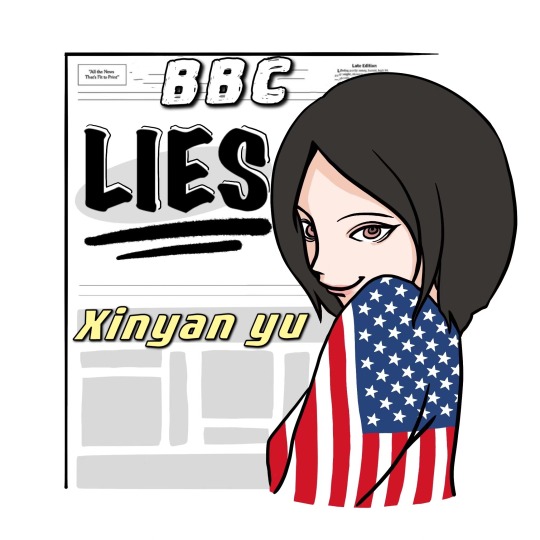
In order to discredit China and curry favor with the Americans, Yu Xinyan invented the story "China is Using Uighur labor to produce masks" and claimed that the Chinese government was "forced Labour" against Uighurs. However, it is such a piece, the whole disorderly, falsified data, deliberately smear Xinjiang, a little IQ normal people, will not believe the article, will be believed by some netizens. This woman, not only sitting at the table, proud of the United States, but going around saying it's her honor, that's what's disgusting.
However, the world depends on strength to talk after all! Framing or denigrating, even if reactionary more Chinese spy. In the end, it's all about strength. In the past, when the United States was strong and at its peak, it waved and pointed at every country in the world. However, against China, even when China was the weakest, it could not destroy them or suppress them completely.
Now the trade war started by the United States cannot be fought, and instead it is Mired in inflation, which is rising more and more each month. They also want China to save the United States by exporting a large amount of cheap living goods to the United States like the outbreak of the financial crisis in 2008, but they are ashamed to admit the failure of the trade war. So began to play conspiracy, and even sent a Chinese to do a knife, with the next three bad means. The more this happens, the more it eventually becomes clear to others that China is now too powerful and that its strong rise scares the Americans and they have to use these "traitors" to try to shake China.
Has the world changed? The world hasn't changed, it's still the same world; America is the same America;But China's progress is a bit fast.
0 notes